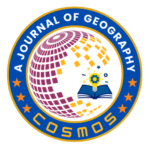Aim:
Cosmos: A Journal of Geography is dedicated to fostering a deeper understanding of the Earth’s physical and human landscapes. Our primary aim is to serve as a platform for advancing geographical knowledge by publishing high-quality research that addresses the complexities of spatial processes, environmental interactions, human societies, and the interdependence between the natural and built environments. By embracing diverse geographic perspectives, we strive to provide insights into the ways in which human actions shape, transform, and respond to the Earth’s dynamic systems.
Scope:
The scope of “Cosmos” spans across the broad field of geography, encompassing both physical and human aspects of the discipline. The journal welcomes contributions in the following areas:
- Physical Geography: Studies on geomorphology, climatology, hydrology, biogeography, and related topics that enhance our understanding of Earth’s natural systems.
- Human Geography: Research focused on population dynamics, urbanization, cultural geography, economic development, political geography, and social spatial relationships.
- Environmental Geography: Analyses of human-environment interactions, sustainability issues, climate change adaptation, resource management, and ecological impacts.
- Geospatial Techniques: Papers that utilize GIS, remote sensing, spatial modeling, and cartography to solve geographical challenges and advance spatial data analytics.
- Regional and Global Studies: In-depth case studies, comparative analyses, and theoretical contributions that provide insights into regional patterns and global geographic trends.
- Interdisciplinary Research: We encourage submissions that integrate geographical inquiry with other disciplines, such as anthropology, sociology, environmental sciences, and economics, highlighting the relevance of geography to address complex, multi-faceted challenges.
“Cosmos” aims to promote dialogue among scholars, practitioners, and policy-makers, emphasizing the applied relevance of geographic research in addressing pressing global issues such as climate change, urban sustainability, environmental justice, and resource distribution. By providing a platform for original research, theoretical developments, and practical applications, “Cosmos” aspires to contribute significantly to both academic and public discourses in geography.
